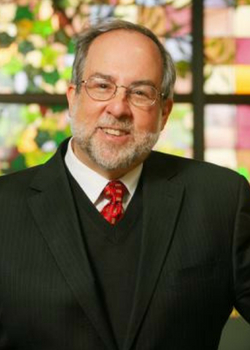The Nazis took my uncle Henry at the very beginning of the war. He survived more than five years as a slave. Young and strong, he was a carpenter, and they needed carpenters. At first, they moved him from camp to camp, including a stay at Pleshow, where Schindler's list was born, and finally, Auschwitz. A slave laborer, he helped build the camp. When the Allies advanced, he was taken on the infamous Death March from Poland into Germany. He was liberated by the American army in 1945.
For as long as I can remember, my uncle never spoke about these experiences. We knew that he had been in the camps from the numbers on his arm and from his peculiar personal habits ... the way he slept so still, as if he were still hiding. But he would never reveal to any of us where he'd been, what he'd seen, what he knew.
When their children were grown, my aunt returned to school. She took a course in Jewish literature. Among the books assigned was Elie Wiesel's Night Wiesel's account of his time at Auschwitz. She left the book on the coffee table in the living room, and my uncle picked it up one afternoon and began to read. He knew all the characters and places in the book. He had witnessed every event Wiesel described. Later in the semester, Wiesel came to lecture at the university and my aunt and uncle went to hear him. Following the lecture, they approached Wiesel. They discussed people and places and moments my uncle hadn't recalled in more than 40 years. For nearly two hours, they stood together in the deserted lecture hall. Finally, Wiesel looked into my uncle's eyes and asked him, "Have you told your children?" My uncle sheepishly replied that he had not, he could not. Wiesel admonished him, "You must! If you do not, they will never really believe it happened! Be a witness!"
At a Passover meal, some months later, he sat us down, and for more than three hours, told us his story: The deportation, the brutal separation from his family, the camps, the cruelty, the brutal march through the Polish winter, and finally, the liberation. When at last he finished, we sat in silence for some time. When we gathered the courage, we asked him why he'd waited all these years to share this. He looked at us with an embarrassed expression, "How could you understand? You grew up here, in freedom and safety. You don't know hunger or fear or hate. And why would I want you to know that? I've spent my life protecting you from that nightmare." So why tell us now? "Because Wiesel is right. If you don't hear it from me, you'll never really believe that it happened, you will never believe it was real. It's time for me to be a witness."
Uncle Henry taught me to understand the Exodus. I can imagine a generation of ex slaves caught in his dilemma: How can I describe realities you can't possibly imagine? You know nothing of slavery, of degradation, of fear and hatred. And how much do I want you to know? But if I don't tell you, you'll never believe it was real. If you don't hear it from me, it will remain impersonal, theoretical, abstract history. You must know that these things happened, and that I was there. I tell you this story so that my memories may become your own. You too must become witnesses.
We are instructed: "B'chol dor vador In every generation, a person must see him/herself as if he or she were redeemed from Egypt." (Mishna Pesachim 10) This is a radical demand. It isn't enough just to remember or commemorate or celebrate the Exodus from Egypt. We have to be there personally and feel it. We must become witnesses to these events. Collective history must become personal memory, and memory must become testimony. Only as witnesses to the harsh brutality of slavery will we be consumed with the divine demand for justice. And only as witnesses to liberation, will we truly believe that redemption is possible. That moment of liberation will forever keep us from surrendering in the face of the world's severe brokenness.
Evil is real, we have felt its cruelty. And redemption is also real, we have sung its song. When the sea split, our history turned transparent. We perceived God's presence and God's purposes in human history. We are witnesses.
Shabbat Shalom.

